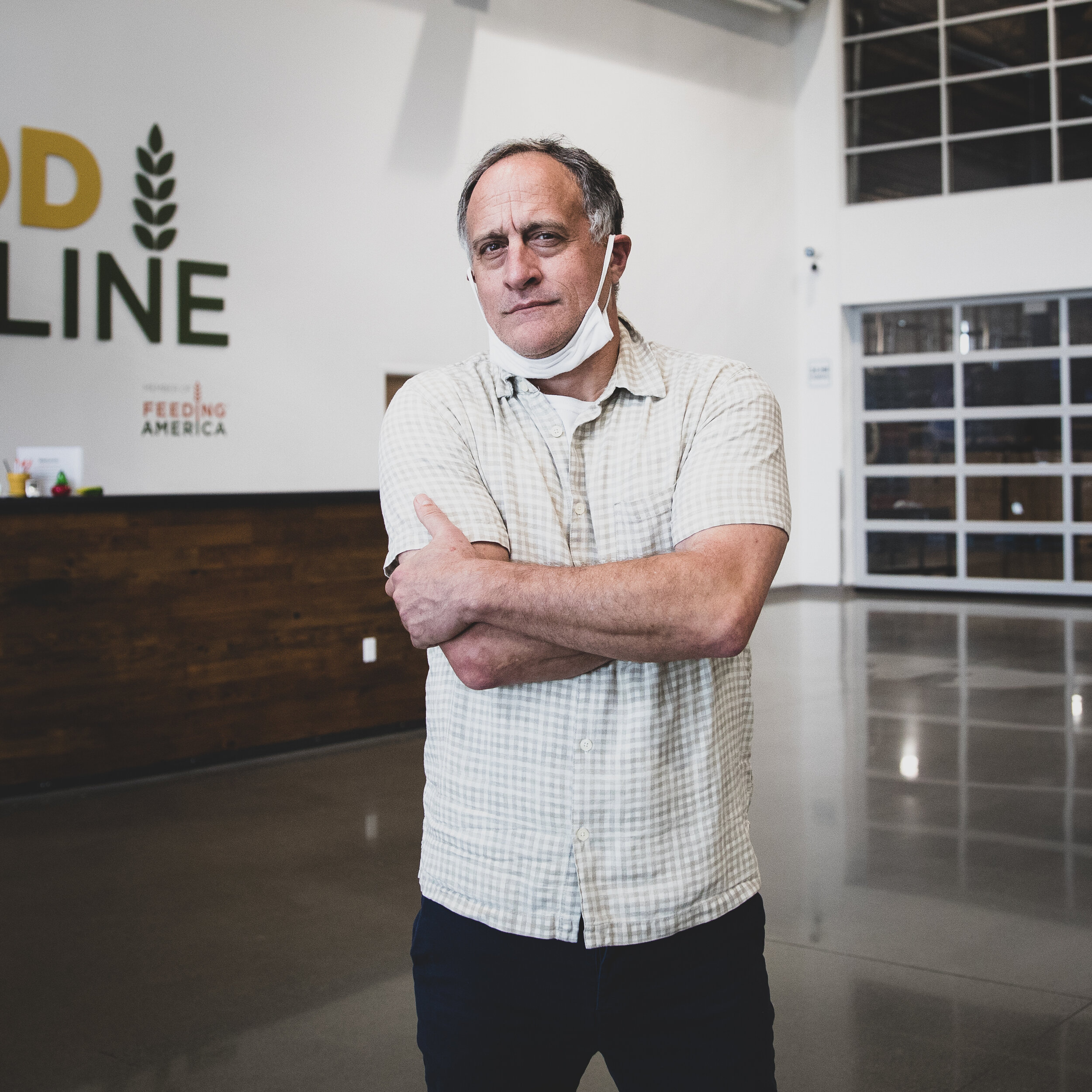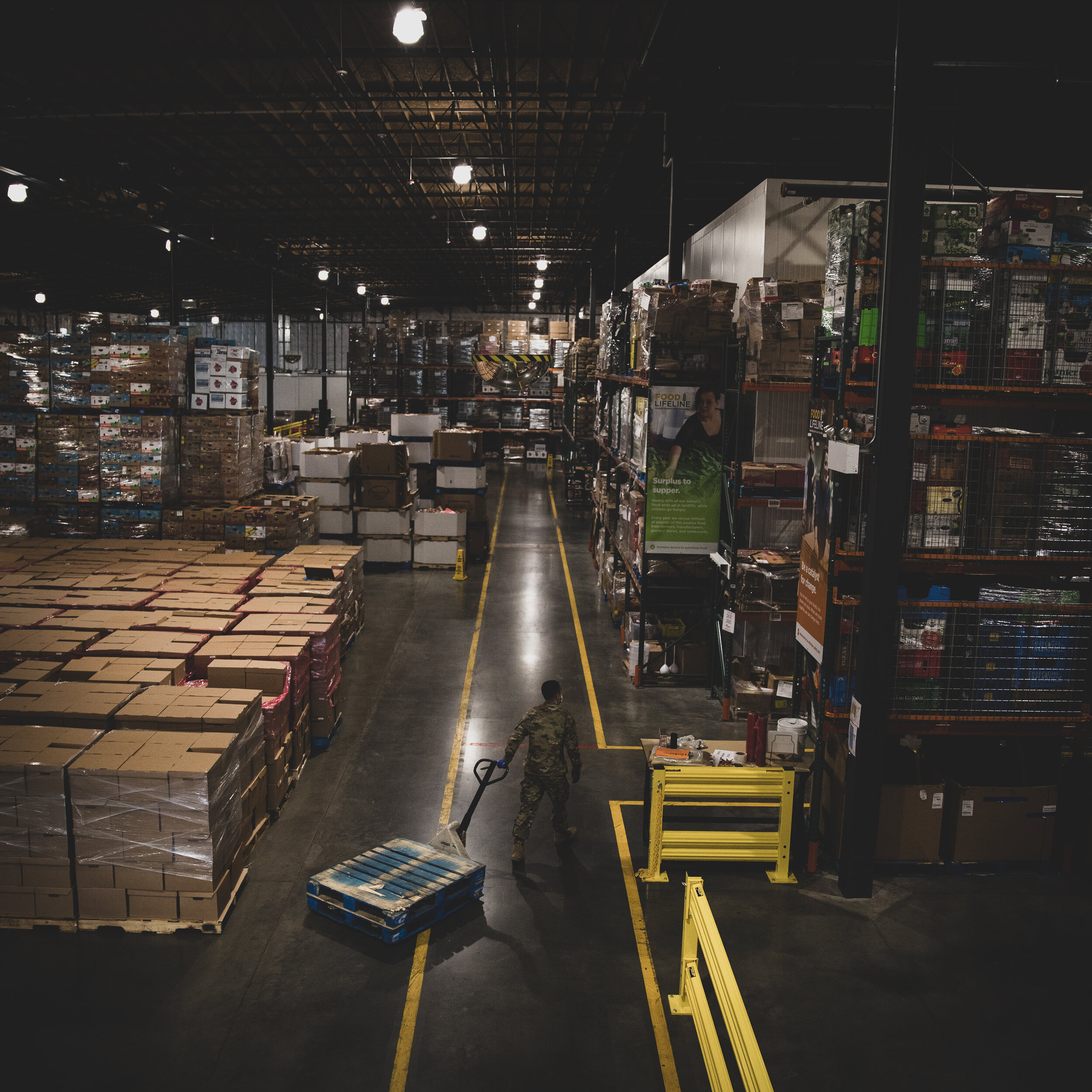Food Lifeline - Mark Coleman
Mark Coleman - Food Lifeline
Mark Coleman - Interview Transcript
We rescue food from farmers, manufacturers, grocery stores and restaurants. So 85 to 90% of the food that we push out is rescued, okay. Last year that was 60 million pounds of food that we rescued, and that created the equivalent of about 45 million meals, okay. So that's a normal day. That's a normal week. That's a normal year. In Western Washington, we serve 300 food bank shelters and meal programs, so just about every one of them. We supply them with about half of the food that they have. The rest they raise on their own. They get some from Northwest Harvest. But we are the largest distributor. So I say, well, we're the food bank's food bank. That's the best way to describe it.
Because we rescue, we need volunteers. Eery year we have 18,000 volunteers that come in here 'cause they have to sort and repack all this food. We get it in by the semi-load. I can't dump a semi-load of tomatoes on the neighborhood food bank, right. So the volunteers come in and they sort and repack the food. And then our food bank and shelter clients can go online and they order. They put in their order online. They come and pick it up or we deliver it. So, since COVID, grocery store shelves are empty. Volunteers can't come to work. So the food's not gettin' picked up. Drivers can't get the food here, because they're shut down, whether it's the farmers and the manufacturers. And then we don't have the volunteers here either to sort and repack it, even if the donations did come in. So we're without any food. So what we've had to do is purchase food, okay. And we're purchasing all shelf-stable food. Those boxes that you see over here in the warehouse, we're building 100,000 of those a week with the help of the Washington National Guard.
So they're helping us put those together. And the cost is running in the millions. It's anywhere between $4 and $6 million the last month and a half. So we've been having to raise money for that. So in those boxes, we have things like peanut butter, tuna fish, rice, beans, anything that is shelf-stable, and then we're able to add whatever fresh produce and fresh grains we have. We're sending out to our food banks and shelters, but it's not enough food getting out. So now we're doing our own distributions, and that's what we did on Friday. We had cars lined up all the way up the hill to get in, and it was a three hour distribution. We had 521 families and we passed out 1,350 roughly of those boxes. So this week we're doing it six times. We're doing it at North Gate Mall. We're doing it at North Bend Outlet Malls and the Tulalip Premium Outlet Malls. So twice each location this week, one morning and one afternoon distribution, and we hope to put out an extra 30 to 40,000 of those boxes.
1.5 million people right now are in need of food. If you do the math, we had 700,000 applications for unemployment the first week. That was a month ago. Every one of those people, they're not making it on that unemployment check. I mean the unemployment checks are a little bit larger now and that's helpful, but still for a lot of these families. So, and that was the other thing with these distributions we're doing, it's for anybody. You don't have to be a food bank client. You don't have to fill out a form. We don't need to know where you live, how much you make. We ask for your zip code just so we can let people know, our donors know what, where the food's going. But we want them to come get this food. You don't have to be poor. You don't have to be in crisis. You just have to need it now. So that's really the message we want to get out there is that we all need some help. And you may make a lot of money while you're employed, but when you're not, the whole thing stops.
Poverty is still a problem, and income inequality. This state used to be number 27 in the country for income inequality. We're number four now. And that's all those high tech dollars coming, which are great, and if this is absolutely nothing about the high tech, other than it's just made it more difficult to live here, for a lot of people. And again, I'm not pointing fingers at anybody. Tech and growth are great, but we have to address the problems that it creates and the inequality that we find. So for us to jump from 26 or 27 on that chart to number four is awful. 40% of the food in this country goes to waste, but there's no physical way to get all of that. There's a physical way for us to get about 10 to 15% of it and for us at 60 million pounds a year of good food. So we can't food bank our way out of it. There isn't a magic number. There is food banking and then there's long-term solutions to poverty, which will affect the hunger numbers. And then we'll have a solution.
Well, what we're asking for is cash donations. Even the smallest cash donation, a dollar creates between four and five meals. So you donate $5, it's like 20 to 25 meals for a family that's struggling and we're trying to get as much food as possible and raise as much funds, 'cause we just don't know what it's going to look like. We're starting to open up cities now and open up neighborhoods and we don't know what that's gonna look like as far as the infection and people want to volunteer badly, but we just can't take 'em right now. Like I said, the Guard's managing to do everything we need to do. What we really need are our people's prayers and their dollars.
As divided as this country has been over the last three years, I think there's been an unintended result of this crisis bringing us together a bit, even though we're not physically together. I mean the cards and letters we get with these donations, we had a an eight year old send us $44. It was his allowance for the last four weeks. It blows my mind. You're like, really? It's overwhelming to watch. It's what we need right now. It's something everybody can get behind and I think it's gonna change things. I think it's gonna change the narrative in this country when this is all over. We're gonna to remember this.









